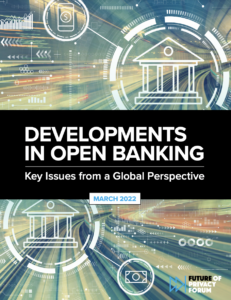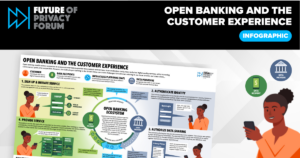The field of open banking refers to a data ecosystem in which data providers, such as banks and credit unions, send personal financial data to companies (e.g., fintechs) at a customer’s direction, in order to provide new products and services to the customer. Examples of these products and services include peer-to-peer payments, wealth management, and tax filing.
Open banking frameworks differ from country to country, but the interplay between open banking and data protection law raises important issues that all jurisdictions must address. Open banking can be a catalyst for greater competition by enabling new products and services that depend on the sharing of personal data. That sharing of personal data is integral to realizing these benefits presents privacy and security risks, including the risk of data breaches and unauthorized transactions. FPF works with a community of experts to identify the privacy and data protection risks in this space, educate policymakers about the challenges facing the open banking ecosystem, and develop best practices and policy recommendations.
Featured
FPF Files Comments with the Consumer Financial Protection Bureau Regarding Personal Financial Data Rights
On December 21st, 2023, the Future of Privacy Forum filed comments with the Consumer Financial Protection Bureau (CFPB) in response to the notice of proposed rulemaking (NPRM) regarding personal financial data rights. FPF’s comments focus on promoting privacy as a core tenet in the U.S. open banking ecosystem in order to protect individuals’ personal information […]
FPF Response to CFPB Data Portability Proposal
In response to the Consumer Financial Protection Bureau’s (CFPB) request for comment regarding data portability for financial products and services, the Future of Privacy Forum filed comprehensive comments and recommendations, urging the Bureau to craft balanced, informed privacy rules that protect individuals’ personal information while enhancing trust in the privacy and security of emerging data […]




